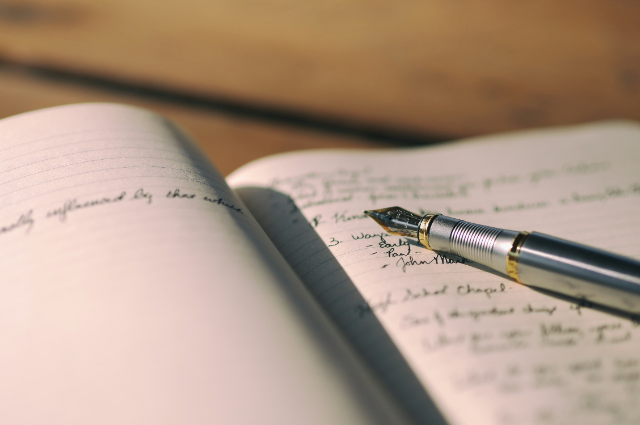
Photo by Aaron Burden on Unsplash
Humans have tried to communicate with each other since the time they were naive and exploring their habitat and nature around them. In the absence of language in those times, they drew what they saw through chisels and anything capable of making marks on. Many such inscriptions have been seen in different parts of the world. Petroglyphs in bhimbetka caves give evidence of earliest humans and ancient animals giving today's generation a glimpse of the stone age. Bharat being a sagacious country has always been known to the world for its hospitality and erudition. The magnificent history of India and scriptures were written on palm leaves (bhoj patra). Feathers of swans and gooses were used as kalam whereas ashwagandha was used as ink. Our sages always knew the importance of identifying the events. Vedas (pramata), the ultimate source of knowledge, took birth in our country due to the impeccable writing skills of people here. The Ramayana and The Mahabharata, prominent books written by Valmiki and Ved Vyas are anecdotal evidence of that time that still instil in us the morals of life.
“From creating illustrations to jotting down bomb formulas, humans have relied on a small ink pen more than anything else”.
Just like rays of the sun reach every corner of the world giving lives to budding flowers and invigorating beings. In the same way, from preserving history in the form of anecdotes to calligraphy and prints, the pen made its way all around the globe. From Jugal Kishor to Mahatma Gandhi, history is replete with times when common men were able to influence and change the circumstances with the mighty power of the pen. Instead of revolting with a sword they chose to free the motherland from the shackles of slavery with the flambeau of their paramount knowledge. From eradicating sati in India to making people aware about their rights, from conveying information and connecting people to enlightening them of their surroundings. All this was made possible through valiant writers. So the tradition of disseminating information through anthologies was always part of our lives while earlier it was mostly used to educate and embolden common people to follow ethics and moral values but with the introduction of the press the motive of writing changed.
In India, the press first sauntered in Goa in 1556 C.E. with limited book printings but soon took giant form turning to be a potent tool to astound the British Raj. Whether it be Augustus Hickey's 'Bengal Gazette', Raja Ram Mohan Roy's 'Sambad kaumudi' or Bal Gangadar Tilak's 'Kesari' the press strengthened the roots of unity in the country by bringing everyone under the umbrella of cognizance. Although, Britishers advertently created many legal impediments like the Censorship Press Act 1799 was brought by then Governor-General Richard Wellesley and the Licensing Regulation Act by John Adams in 1823. After the first war of independence in 1857, Britishers were left adread and in order to outthrow roots of unity they brought the Vernacular Press Act in 1878. Lord Lytton enacted the law to counter the weapon of rising nationalism in the country which was phenomenally increasing by revolutionaries' vehement writing. They wanted to scrutinise the work of the press and halt its growth in their occupied colony, not letting citizens know of their wicked policies but were severely trounced by their formidable opponent and were forced to bring down their own laws. With the veil taken off from the activities of the British government, they were bound to leave the country. In this way, the press played the role of Brahmastra in the independence of our country from insolent Britishers.
The esteemed supreme law of India which is the lengthiest in the world and empowers native citizens with imperative rights is in fact handwritten by Prem Bihari Narain Raizada and is well kept in special helium-filled cases in the Central Library of Parliament. Be it any sphere, the power of writing remains indomitable. And thus the press became the backbone of the world's largest democracy. No doubt even our former Vice-President and then President K.R. Narayanan also spent a major part of his life as a revered journalist. In many countries like America, there is a separate article for the press but in our country the heart of the constitution Article 19(1) secures every citizen's right to speech and expression, giving them the right to voice against wrong without hurting sentiments and peace of the nation. Thus broadening the concept of media for a country's healthy democracy.
In today's era of the internet, anything posted on Twitter can easily swap opinions of people, strain and even reconcile relations among countries. Nations can fight with swords, guns, ammunition, nuclear weapons and whatnot but it all starts and ends with a pen, making clear that even the power of arms lies in a small pen. And as the adage goes, wisdom can subdue might. The authority given to an intellectual man is a boon whereas handover to a lout will always backfire and can destroy ages to come.
